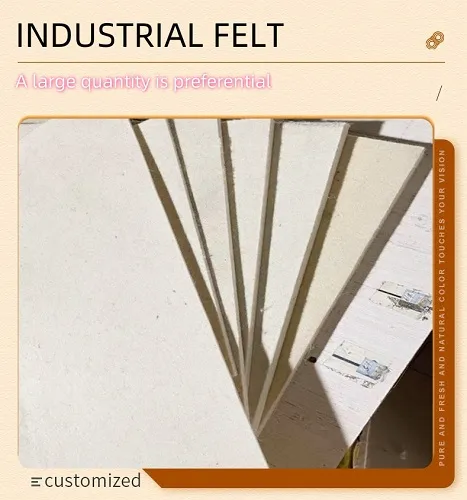industrial felt material
The Versatility of Industrial Felt Material
Industrial felt material has emerged as a crucial component in various industries due to its unique properties and versatility. Composed primarily of wool or synthetic fibers, industrial felt is a dense and durable material that finds its application in sectors ranging from automotive and manufacturing to construction and aerospace. This article explores the characteristics, uses, and advantages of industrial felt material.
One of the defining features of industrial felt is its density and strength. The process of felting involves matting, condensing, and pressing fibers together, creating a non-woven fabric that boasts both insulation and cushioning properties. This makes industrial felt an ideal choice for applications that require soundproofing and vibration dampening. In the automotive industry, for example, felt is often used in vehicle interiors to reduce noise and create a more comfortable environment for passengers.
Moreover, industrial felt is highly resistant to wear and tear, making it suitable for high-stress applications. Its durability allows it to withstand heavy loads and extreme conditions, which is why it is frequently employed in manufacturing environments. Conveyor belts with felt linings enhance grip and reduce slippage, ensuring efficient material handling in factories. Additionally, felt can be treated with various coatings to improve its resistance to moisture, chemicals, and temperature fluctuations, further broadening its usability.
industrial felt material

Another remarkable characteristic of industrial felt is its ability to absorb sound and vibrations. This acoustic property is particularly beneficial in industries where noise reduction is a priority. It is commonly used in construction projects, such as soundproofing walls, ceilings, and floors to create quieter living and working environments. This makes industrial felt an essential material in urban settings where noise pollution is a growing concern.
The applications of industrial felt material extend beyond interiors and machinery to include protective gear and specialty products. For instance, felt is often utilized in the production of pads, mats, and protective covers that shield sensitive equipment from damage. The soft yet dense nature of felt provides the necessary cushioning to protect delicate surfaces from scratches or impacts.
Furthermore, the sustainability aspect of industrial felt cannot be overlooked. Natural wool felt, for example, is biodegradable, reducing environmental impact at the end of its life cycle. Manufacturers are increasingly focusing on sustainable production practices, using recycled materials to create synthetic felt options while maintaining performance. This aligns with global efforts to promote eco-friendly practices across industries.
In conclusion, industrial felt material is a versatile, durable, and effective solution for a multitude of applications. Its properties make it indispensable in sectors requiring noise reduction, impact protection, and load-bearing capabilities. As industries continue to evolve and seek innovative materials, the role of industrial felt is poised to expand further, solidifying its importance in various fields. With ongoing advancements in manufacturing techniques and sustainability practices, the future of industrial felt material looks promising, promising new applications and benefits for manufacturers and consumers alike. Whether in automotive, construction, or specialized protective gear, industrial felt remains a reliable choice in the modern industrial landscape.
-
What Makes Felt a Great Choice?NewsNov.19,2024
-
Total Mixed Ration (TMR) Feed for CattleNewsNov.19,2024
-
The Ultimate Guide for Felt Polishing WheelsNewsNov.19,2024
-
Industrial Felt for Various ApplicationsNewsNov.19,2024
-
Felt Makeup Bags and Inserts BagsNewsNov.19,2024
-
Choosing the Right Hotel TowelsNewsNov.19,2024
-
Your Go-To Guide For Affordable Wholesale Wool FeltsNewsOct.31,2024







